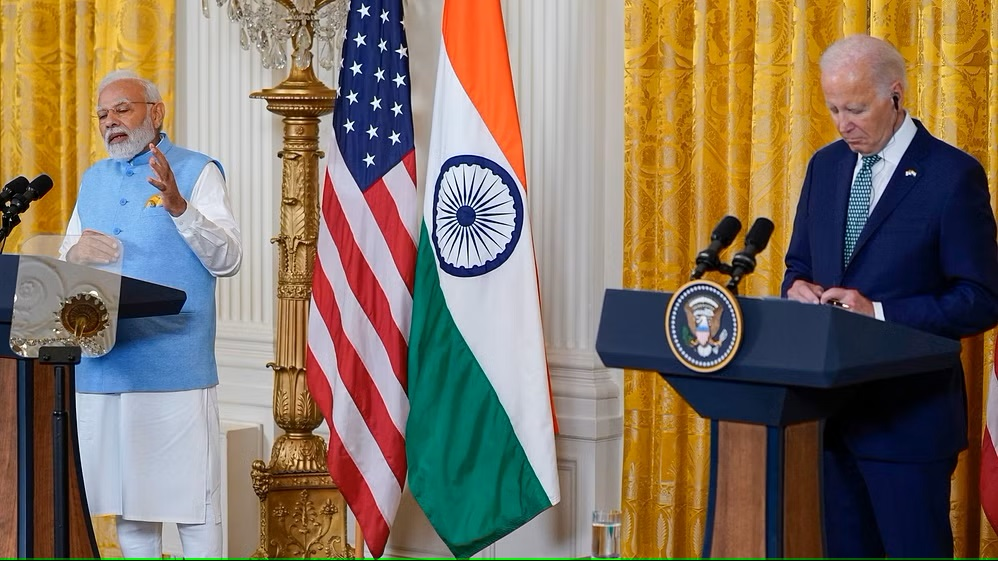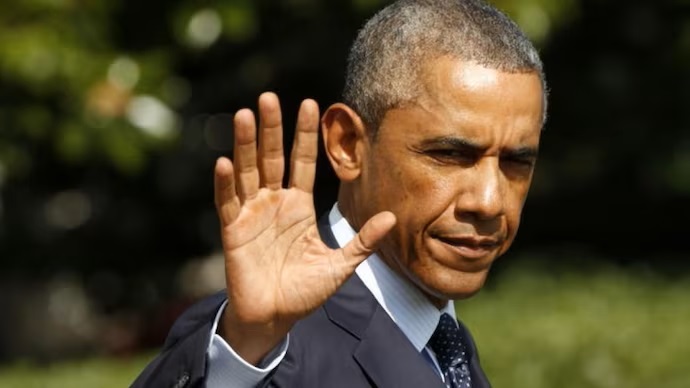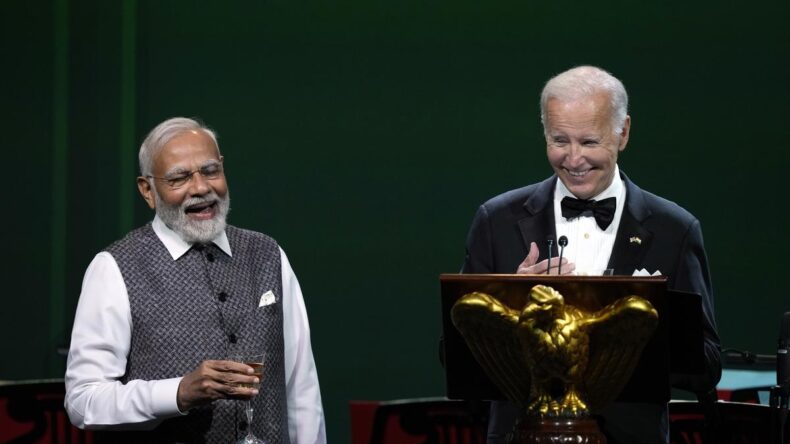In a joint press conference with President Joe Biden, Indian Prime Minister Narendra Modi responds “There is no space for discrimination in India” when questioned by the US media about the growing hate crimes against minorities and religious intolerance in Inda.
Photo: AP
During this press conference PM Narendra Modi was questioned about the measures his government was willing to take measures to improve the rights of Muslims and other marginalized groups and uphold free speech. Modi responds to this by stating that democracy runs in the DNA of the nation and that it is in their veins. He adds that there is absolutely no space for discrimination on caste, creed, religion or gender in India. Before the conference, Modi had essentially agreed to answer only two questions.
US President’s decision to host Modi has been highly questioned and rebuked by human rights advocates and several US legislators. When questioned about being pressurized by Democrats to address human rights in India during his meeting with Prime Minister Modi, Biden restated the strong admiration and respect shared between the United States and India. He emphasized that their conversation focused on democracy and highlighted the deep respect that exists between the two countries, considering they are both democratic nations. Biden stated that their relationship is founded on mutual respect.
Manipur continues to burn as Modi visits the US.
Since May 3, Manipur has experienced intense turmoil characterized by extensive ethnic clashes between the Meitei community, which holds dominance in the Imphal valley, and the Kuki community, which constitutes the majority in the hill districts. This violent situation has resulted in a minimum of 115 fatalities, over 300 injuries, and the displacement of approximately 40,000 individuals from both communities.
As Modi completes the third day of his US visit, internet services continue to be suspended in Manipur and the state experiences constant unrest and instability. Mobs have reportedly demolished or caused damage to over 200 churches and 17 temples. Homes of local ministers and legislators have been attacked and set ablaze.
Response to Modi’s US visit.
US House representatives Rashida Tlaib, Representative Ilhan Omar, Representative Alexandria Ocasio-Cortez, Cori Bush and Kweisi Mfume have expressed their intention to boycott Modi’s address to the Congress as a protest against the growing religious intolerance and discrimination of religious minorities in India. Their boycott is to stand in solidarity with the Muslims, Christians, Sikhs and Dalits, the communities affected by Modi’s fascist government.
In a joint statement, Tlaib, Bush, Omar, and Bowman emphasized Modi’s extensive record of human rights abuses, including his alleged involvement in the 2002 Gujarat riots that resulted in the deaths of over 1,000 people. They also accused his government of targeting Muslims and other religious minorities, supporting Hindu nationalist violence, undermining democracy, suppressing criticism through authoritarian tactics like internet shutdowns and censorship, and intimidating journalists and dissidents.
The representatives considered it disgraceful to grant Modi the honour of addressing a joint session of Congress, stating that participating in such an event would condone the aforementioned abuses. They also called on other members of Congress who advocate for freedom and democracy to join them in boycotting what they considered to be an embarrassing spectacle, stressing the importance of not compromising human rights for political expediency.

Photo: Reuters
Former United States President Barack Obama stated that President Joe Biden should address the issue of safeguarding the rights of Muslim minorities in a predominantly Hindu India during his meeting with Indian Prime Minister Narendra Modi. Obama added that if President Biden were to meet Modi, addressing the rights of Muslim minorities in India is an issue worth mentioning.
Obama further expressed that if he had the opportunity to converse with Prime Minister Modi, he would emphasize the importance of protecting the rights of ethnic minorities in India to prevent internal conflicts and potential fragmentation of the country. He stressed the significance of having open and honest discussions about such matters.












